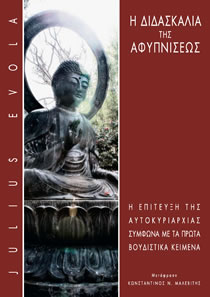The first single publication in the greek language comes in 1985 and belongs to ΕΛΕΥΘΕΡΗ ΣΚΕΨΙΣ1 editions in translation by Theodoros Maniatis of a speech given in german by Julius Evola in the 7th of December 1940 in Rome with the title ‘‘Die arische Lehre von Kanpf und Sied’’. The passage cited in the home page of our website is honorary taken (and translated) from the cover behind the book. The issue comes under the title ‘‘Το δόγμα των Αρίων για τον Αγώνα και την Νίκη’’ – ‘‘The Arian Doctrine for Struggle and Victory’’. In the relevant speech and after a deep metaphysical parallelism of the significance that battle and warrior’s concepts have in the Greek and European Mythology as well as in the Indoeuropean tradition, with the eternal spiritual struggle, Evola stresses the necessity of this struggle today from the intellectual man of tradition that lives in the Modern World. A very comprehensive text that in a few pages clearly reflects the general though of the Italian philosopher. The greek text is written in the old polytonic style.
Before that and in the next decades we find numerous references on Evola together with the translation of personal articles, speeches or single chapters from his various books in several historical, philosophical magazines and issues of different political organisations.
The first book of Julius Evola in the greek language is ‘‘The Metaphysics of Sex’’ – ‘‘Η Μεταφυσική του Φύλλου’’, in translation of Fotis Terzakis published by OXY publishing house in February 1998 and accomplishing a second edition, eight years later in September 2006. In Metafisica del Sesso which is the original title of the work published in Rome in 1958, Evola studies the attraction between the two genders from the point of view of the different traditions together with the status of masculine and feminine power in the universal empyrean. A metaphysical approach in various aspects of love and sexuality, such as pleasure, masochism, sadism, jealously, sexual honor, chastity, prostitution, onanism, marriage.
In May 2009 comes in publicity by ΛΟΓΧΗ2 editions and in translation of Konstantinos Kitsios, the ‘‘Revolt against the Modern World’’ (Εξέγερση Ενάντια στο Σύγχρονο Κόσμο) that many of his readers classify as the most important work of the Italian philosopher. For some Rivilta Contro il Mondo Moderno (Original, 1934) is an introduction to the traditional way of thinking that Julius Evola possesses. For others it is the gem of all knowledge as if Evola has mixed all his books in one, those he had already written and those we was planning to write. Maybe is this comprehension of concepts that in many points make this work a bit obscure for the common reader. Consisted of two parts, with the first part bridging the gap between cosmic and transcendental through traditional values and the second contra- distinguishing the traditional societies to the modern world of our days.
One year later, during the last days of April 2010, we have the release of ‘‘Τhe Doctrine of the Awakening – H Διδασκαλία της Αφυπνίσεως’’, a private edition, by the translator Konstantinos Malevitis. In La Dottrina del Risveglio (Original, 1943), Evola offers an excellent analysis of the oldest Pali texts of original Buddhism, which reflect the cultural, metaphysical and transcendental content of the in question eastern tradition. An active code, trait of a moral and intellectual aristocracy. A heroic way of life that against the passive approach of modern religions, praises and projects the exercise, the discipline and the monasticism. A hard way to cross, a path invisible for the big mass, intended to an elite of ascetics of a higher spiritual nobility.
In May 2011, ΛΟΓΧΗ2 publishes with great success their second book in the greek language. A text of Julius Evola first published in italian, in 1951 widely known as Orientamenti (Orientations). Maybe, never before a text appeared to be so small on the one side, but so comprehensive in its meanings on the other. And if Plato had to write the Laws as a base where we should step in order to found the ideal aristocratic State, Evola comes to give directions at the time where Europe has just come out, devastated from World War II. In a world of ruins, Evola will give his own directions for the regeneration of the aristocratic ideal. Written in simple language, something unusual perhaps in relation to his other texts, Evola is probably for the first time is as clear as possible. One (1), two (2) , three (3), four (4) .... And what if everything sounds that simple, and what if the Greek philosopher Pythagoras claims that ‘‘the beginning is half of everything’’ . How simple is for a human being to be evolved to into something superiorly unique? A man who will be the cellular part of a broader breathing entity, a man who will act aristocratically, far away from political parties propagating points of a false political realism. A fighting action of a different attitude, an exemplary and aristocratically superior way of living, a silent revolution. And what if in order to pass from the first (1) to the second (2) step, a thousand (1000) years is required? We are already prepared to await a thousand years more. Orientamenti has been rightly classified as a great text. And if the soviet communism and the Berlin’s wall just required a single day to collapse, once democracy and liberalism have collapsed as well, together with all their derivatives, once the sun rises bright again, then this text might be described prophetic, as well as sacred. ‘‘We anticipate’’, some people will exclaim. From our side, we are just aware: Done is what was to be done!
1 Freedom of Though (trans)
2 The Spear (trans)







